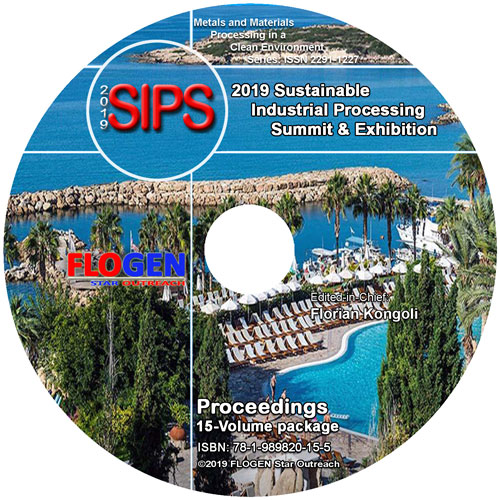2019-Sustainable Industrial Processing Summit
SIPS2019 Volume 15: Oxidative Stress for Sustainable Development of Human Beings
| Editors: | F. Kongoli, H. Inufusa, C. Amatore, H.Y. Chen, W.H. Huang, T. Yoshikawa |
| Publisher: | Flogen Star OUTREACH |
| Publication date: | 20 December 2019 |
| Pages: | 64 pages |
| ISBN: | 978-1-989820-14-8 |
| ISSN: | 2291-1227 (Metals and Materials Processing in a Clean Environment Series) |

CD shopping page
Oxidative Stress: Cancer and Oxidative Stress
Naomi Okada1; Fuhua (Fukka) Yang (You)2; HARUHIKO INUFUSA3;1GIFU UNIVERSITY, Gifu, Japan; 2GIFU UNIVERSITY DIVISION OF ANAEROBE RESEARCH, Gifu, Japan; 3TIMA JAPAN CORPORATION, Gifu, Japan;
Type of Paper: Regular
Id Paper: 230
Topic: 54
Abstract:
Molecular targeting drugs were referred to as a paradigm shift in cancer treatment; it could not be beyond cytotoxic chemotherapy in terms of side effects and drug resistance. Only three treatments, namely surgery, chemotherapy and radiation have been the treatments for cancer for a long time. Because removal of cancer is the essence of these treatments, patients have been forced to carry a heavy burden. Various immunotherapies have been developed based on the theory, but almost all have failed. Immune checkpoint inhibitors (ICIs), however, which were the subjects of the Nobel Prize in Medicine and Physiology in 2018, have changed that aspect. Nivolumab, an immune checkpoint inhibitor, has dramatically improved the prognosis of melanoma which is one of the most refractory and poor-prone tumors. Melanoma is now followed by lung cancer, renal cancer, gastric cancer, and so on. ICIs make immune therapy the 4th cancer treatment. The most important thing is that immune therapy with ICIs is essentially different from the conventional three cancer treatments. ICIs work by adjusting the host side environment whereas the latter are is "artificially" eliminating cancer. ICIs only elicit the ability given by God to eliminate the cancer.
As antioxidants also have effects on the environment of the host’s side. These effects have been used in combination with chemotherapy and radiotherapy. Antioxidants have two main effects. One is the prevention from adverse effects of chemotherapy and radiotherapy. Another is the anti-tumor effects. As for the former, the preventing effects from mucinous inflammation and neuropathy caused by chemotherapy and radiotherapy have been reported. The control of these symptoms is important because these adverse effects are the main reason for the discontinuation of the treatments. Many studies have shown that antioxidants have the effects of suppressing the activation of NF-kappaB which leads to cancer growth and apoptosis suppression. According to some reports of chemotherapy, radiotherapy and molecular targeted therapies may have more host-mediated pro-tumorigenic and pro-metastatic effects than anti-tumor effects. Such therapy induced host effects are said to have angiogenesis, metastasis, and tumor-cell repopulation properties which are resistant to therapy. Preliminary in vivo mouse experiments with anti-oxidant composition showed elimination of the pro-metastatic effects of chemotherapy. Tumor growth was observed with short term exposure of 5-FU. Although anti-oxidant composition alone had no anti-tumor effect, tumor growth with 5-FU was completely reversed by anti-oxidant composition. The modulation of host side factors may have the same effects as the treatment itself and antioxidants are considered to be able to become a main player of cancer treatments.
Keywords:
Cancer;References:
1. Balancing efficacy of and host immune responses to cancer therapy: the yin and yang effects. Shbaked Y, Nat Rev Clin Oncol. 2016 Oct;13(10):611-26.2.Systematic Review: Generating Evidence-Based Guidelines on the Concurrent Use of Dietary Antioxidants and Chemotherapy or Radiotherapy. Akiko Nakayama, Karen P, Obianuju Lgbokwe, and Leffrey D. white. Cancer Invest.2011 Dec :29(10 ):655-667.